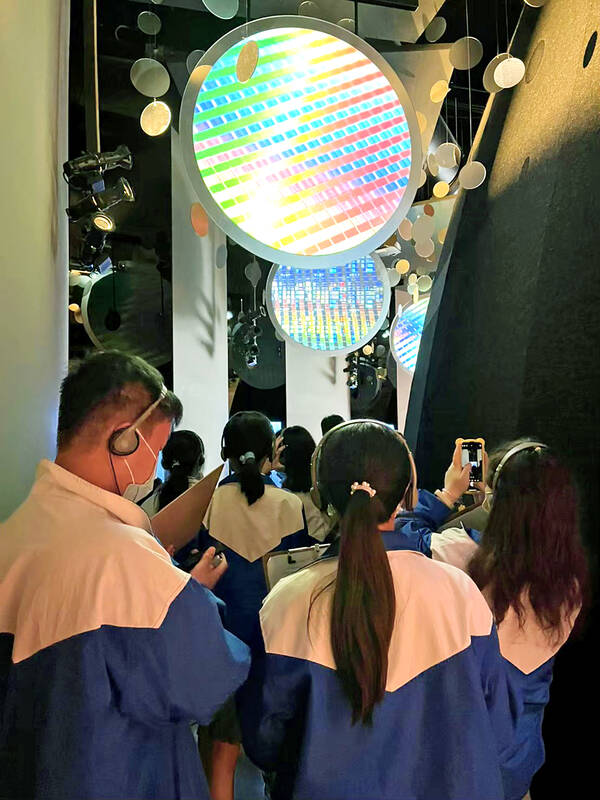The Ministry of Education is to introduce semiconductor courses into high-school curricula, with five pilot courses to be selected this year, a professor who is helping implement the program said yesterday.
The ministry has invited teachers who have taught semiconductor-related courses at the high-school level to help it develop a curriculum that will be used for the program.
One aim of the program would be to increase the interest of high-school students in choosing STEM (science, technology, engineering and mathematics) programs at university, National Taiwan Normal University Affiliated Senior High School teacher Hung Yi-wen (洪逸文) said.

Photo courtesy of Hung Yi-wen
The program is to focus on six areas: electrical science, semiconductor principles, the semiconductor manufacturing process, applications of semiconductors in daily life, circuit design and social issues related to the semiconductor industry, he said.
“Current courses on semiconductors are mostly developed by university professors, so the content might be too difficult for high-school students,” he said.
Teachers who have field experience in semiconductors would help design course content that is more appropriate for high-school students, he said.
The semiconductor industry encompasses three main areas — integrated circuit design, manufacturing, and packaging and testing, Hung said, adding that Taiwan accounts for the majority of these processes worldwide.
Taiwan has achieved its dominance in the industry through a semiconductor ecosystem in which industry-leader Taiwan Semiconductor Manufacturing Co (台積電) works with other Taiwanese companies to form a supply chain.
“Course structure and content for this program will all be designed flexibly, and can be adjusted according to the characteristics of students and teaching needs,” he said.
Citing an example, Hung said the program could make use of six-week or 12-week “micro courses,” and that teachers could even use the material as supplementary material when teaching general subjects.
The program designers would record online teaching videos and students could study them independently, if they wished to do so, he said.
National Chi Nan University president Wuu Dong-sing (武東星) said that in the interest of cultivating talent for the semiconductor industry, interdisciplinary courses that promote inquiry into related subjects should be implemented at the primary and secondary-school levels.
This would help prepare students for interdisciplinary STEM subjects, such as digital systems and artificial intelligence, he said.
“The cultivation of cross-disciplinary talents is a new trend. We are also starting to see more female students who take electrical engineering as their second discipline,” National Taiwan Normal University professor Lin Kun-yi (林坤誼) said.

In his National Day Rally speech on Sunday, Singaporean Prime Minister Lawrence Wong (黃循財) quoted the Taiwanese song One Small Umbrella (一支小雨傘) to describe his nation’s situation. Wong’s use of such a song shows Singapore’s familiarity with Taiwan’s culture and is a perfect reflection of exchanges between the two nations, Representative to Singapore Tung Chen-yuan (童振源) said yesterday in a post on Facebook. Wong quoted the song, saying: “As the rain gets heavier, I will take care of you, and you,” in Mandarin, using it as a metaphor for Singaporeans coming together to face challenges. Other Singaporean politicians have also used Taiwanese songs

NORTHERN STRIKE: Taiwanese military personnel have been training ‘in strategic and tactical battle operations’ in Michigan, a former US diplomat said More than 500 Taiwanese troops participated in this year’s Northern Strike military exercise held at Lake Michigan by the US, a Pentagon-run news outlet reported yesterday. The Michigan National Guard-sponsored drill involved 7,500 military personnel from 36 nations and territories around the world, the Stars and Stripes said. This year’s edition of Northern Strike, which concluded on Sunday, simulated a war in the Indo-Pacific region in a departure from its traditional European focus, it said. The change indicated a greater shift in the US armed forces’ attention to a potential conflict in Asia, it added. Citing a briefing by a Michigan National Guard senior

CHIPMAKING INVESTMENT: J.W. Kuo told legislators that Department of Investment Review approval would be needed were Washington to seek a TSMC board seat Minister of Economic Affairs J.W. Kuo (郭智輝) yesterday said he received information about a possible US government investment in Taiwan Semiconductor Manufacturing Co (TSMC, 台積電) and an assessment of the possible effect on the firm requires further discussion. If the US were to invest in TSMC, the plan would need to be reviewed by the Department of Investment Review, Kuo told reporters ahead of a hearing of the legislature’s Economics Committee. Kuo’s remarks came after US Secretary of Commerce Howard Lutnick on Tuesday said that the US government is looking into the federal government taking equity stakes in computer chip manufacturers that

CLAMPING DOWN: At the preliminary stage on Jan. 1 next year, only core personnel of the military, the civil service and public schools would be subject to inspections Regular checks are to be conducted from next year to clamp down on military personnel, civil servants and public-school teachers with Chinese citizenship or Chinese household registration, the Mainland Affairs Council (MAC) said yesterday. Article 9-1 of the Act Governing Relations Between the People of the Taiwan Area and the Mainland Area (臺灣地區與大陸地區人民關係條例) stipulates that Taiwanese who obtain Chinese household registration or a Chinese passport would be deprived of their Taiwanese citizenship and lose their right to work in the military, public service or public schools, it said. To identify and prevent the illegal employment of holders of Chinese ID cards or